Top Rankings
Excel Academy School District ranks among the top 20% of public school district in Texas for:
Category
Attribute
Student Attention
Lowest student:teacher ratio (Top 1%)
For the 2025 school year, there are 2 public elementary schools serving 150 students in Excel Academy School District. This district's average elementary testing ranking is 1/10, which is in the bottom 50% of public elementary schools in Texas.
Public Elementary Schools in Excel Academy School District have an average math proficiency score of 7% (versus the Texas public elementary school average of 42%), and reading proficiency score of 9% (versus the 52% statewide average).
Minority enrollment is 93% of the student body (majority Black), which is more than the Texas public elementary school average of 75% (majority Hispanic).
Overview
This School District
This State (TX)
# Schools
4 Schools
6,902 Schools
# Students
234 Students
3,737,053 Students
# Teachers
25 Teachers
255,471 Teachers
Student : Teacher Ratio
9:1
9:1
District Rank
Excel Academy School District, which is ranked #1195 of all 1,196 school districts in Texas (based off of combined math and reading proficiency testing data) for the 2021-2022 school year.
The school district's graduation rate of 5% has decreased from PS% over five school years.
Overall District Rank
#1202 out of 1204 school districts
(Bottom 50%)
(Bottom 50%)
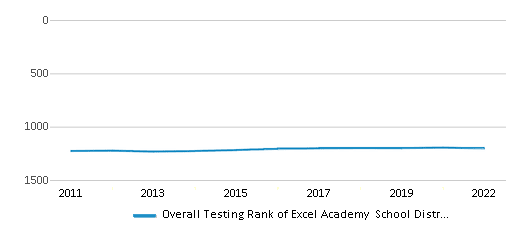
Math Test Scores (% Proficient)
≤5%
41%
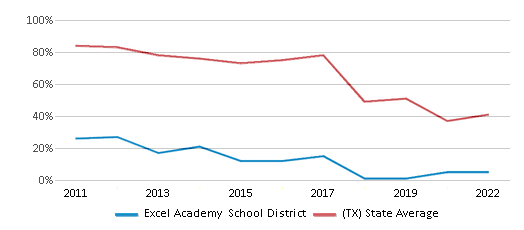
Reading/Language Arts Test Scores (% Proficient)
6-9%
51%
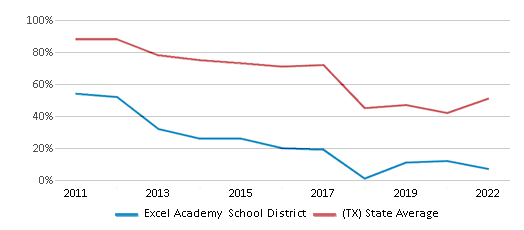
Science Test Scores (% Proficient)
≤5%
46%
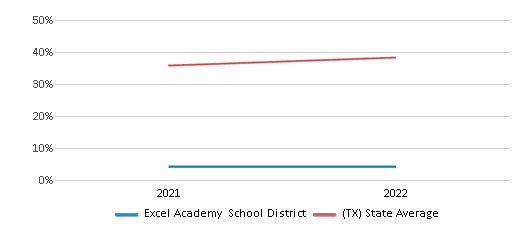
Graduation Rate
≤5%
90%
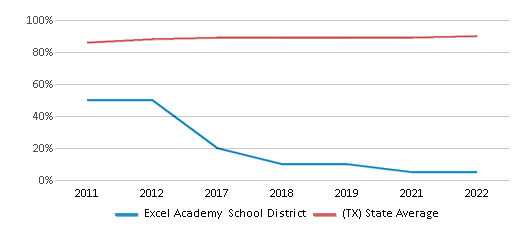
Students by Ethnicity:
Diversity Score
0.58
0.64
# American Indian Students
1 Student
11,705 Students
% American Indian Students
n/a
n/a
# Asian Students
1 Student
203,767 Students
% Asian Students
n/a
6%
# Hispanic Students
97 Students
1,997,454 Students
% Hispanic Students
42%
53%
# Black Students
116 Students
469,194 Students
% Black Students
50%
13%
# White Students
16 Students
924,841 Students
% White Students
7%
25%
# Hawaiian Students
n/a
5,879 Students
% Hawaiian Students
n/a
n/a
# Two or more races Students
3 Students
124,213 Students
% of Two or more races Students
1%
3%
Students by Grade:
# Students in PK Grade:
-
222,501
# Students in K Grade:
-
346,866
# Students in 1st Grade:
-
385,427
# Students in 2nd Grade:
-
402,148
# Students in 3rd Grade:
-
399,623
# Students in 4th Grade:
-
398,690
# Students in 5th Grade:
-
399,071
# Students in 6th Grade:
3
402,143
# Students in 7th Grade:
6
335,034
# Students in 8th Grade:
21
339,814
# Students in 9th Grade:
125
32,833
# Students in 10th Grade:
60
28,116
# Students in 11th Grade:
17
23,862
# Students in 12th Grade:
2
20,925
# Ungraded Students:
-
-
District Revenue and Spending
The revenue/student of $17,821 is higher than the state median of $13,387. The school district revenue/student has declined by 11% over four school years.
The school district's spending/student of $17,470 is higher than the state median of $14,116. The school district spending/student has declined by 11% over four school years.
Total Revenue
$4 MM
$74,029 MM
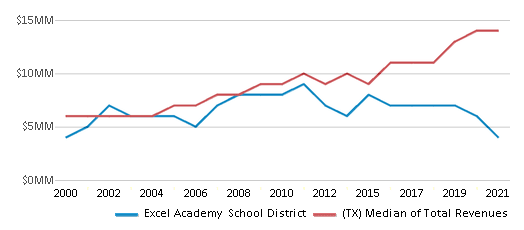
Spending
$4 MM
$78,063 MM
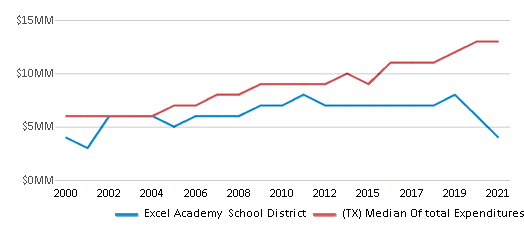
Revenue / Student
$17,821
$13,387
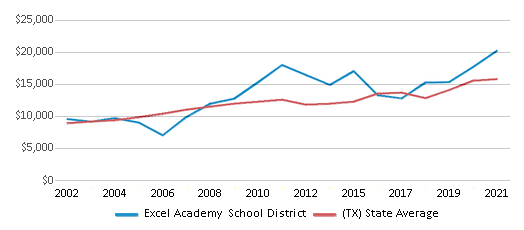
Spending / Student
$17,470
$14,116
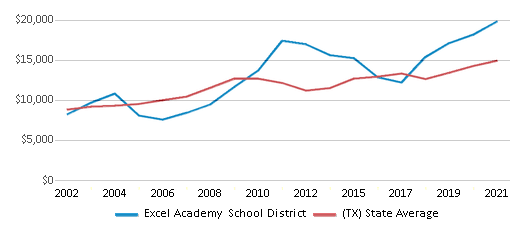
Best Excel Academy School District Public Elementary Schools (2025)
School
(Math and Reading Proficiency)
(Math and Reading Proficiency)
Location
Grades
Students
Rank: #11.
Harris County Youth Village
Alternative School
Charter School
Charter School
(Math: ≤10% | Reading: 11-19%)
Rank:
Rank:
1/
Bottom 50%10
210 Jw Mills Dr
Seabrook, TX 77586
(713) 222-4729
Seabrook, TX 77586
(713) 222-4729
Grades: 6-11
| 37 students
Rank: #22.
Harris County Juvenile Detention Center
Alternative School
Charter School
Charter School
(Math: ≤5% | Reading: ≤5%)
Rank:
Rank:
1/
Bottom 50%10
1200 Congress St Ste 6500
Houston, TX 77002
(713) 222-4354
Houston, TX 77002
(713) 222-4354
Grades: 6-12
| 113 students
Recent Articles

Year-Round Or Traditional Schedule?
Which is more appropriate for your child? A year-round attendance schedule or traditional schedule? We look at the pros and cons.

Why You Should Encourage Your Child to Join a Sports Team
Participating in team sports has a great many benefits for children, there is no doubt. In this article you will learn what those benefits are.

White Students are Now the Minority in U.S. Public Schools
Increasing birth rates among immigrant families from Asia and Central and South America, combined with lower birth rates among white families, means that for the first time in history, public school students in the United States are majority-minority. This shift in demographics poses difficulties for schools as they work to accommodate children of varying language abilities and socio-economic backgrounds.





